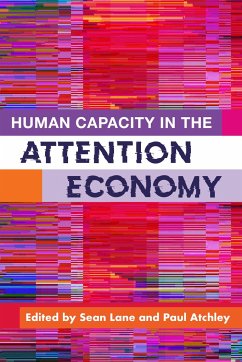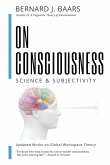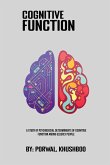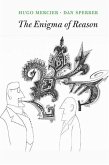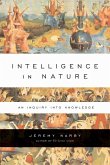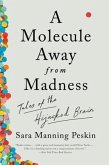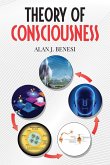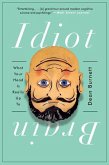Human Capacity in the Attention Economy
Herausgeber: Lane, Sean; Atchley, Paul
Human Capacity in the Attention Economy
Herausgeber: Lane, Sean; Atchley, Paul
- Broschiertes Buch
- Merkliste
- Auf die Merkliste
- Bewerten Bewerten
- Teilen
- Produkt teilen
- Produkterinnerung
- Produkterinnerung
This book examines the impact of ubiquitous information technology, with discussions about what makes these technologies so addictive, and their effect on emotional well-being, memory, learning, driving, and cognitive reserves.
Andere Kunden interessierten sich auch für
![On Consciousness: Science & Subjectivity - Updated Works on Global Workspace Theory On Consciousness: Science & Subjectivity - Updated Works on Global Workspace Theory]() Bernard J. BaarsOn Consciousness: Science & Subjectivity - Updated Works on Global Workspace Theory110,99 €
Bernard J. BaarsOn Consciousness: Science & Subjectivity - Updated Works on Global Workspace Theory110,99 €![A Study Of Psychosocial Determinants Of Cognitive Function Among Elderly People A Study Of Psychosocial Determinants Of Cognitive Function Among Elderly People]() Porwal KhushbooA Study Of Psychosocial Determinants Of Cognitive Function Among Elderly People42,99 €
Porwal KhushbooA Study Of Psychosocial Determinants Of Cognitive Function Among Elderly People42,99 €![The Enigma of Reason The Enigma of Reason]() Hugo MercierThe Enigma of Reason23,99 €
Hugo MercierThe Enigma of Reason23,99 €![Intelligence in Nature Intelligence in Nature]() Jeremy NarbyIntelligence in Nature14,99 €
Jeremy NarbyIntelligence in Nature14,99 €![A Molecule Away from Madness: Tales of the Hijacked Brain A Molecule Away from Madness: Tales of the Hijacked Brain]() Sara Manning PeskinA Molecule Away from Madness: Tales of the Hijacked Brain15,99 €
Sara Manning PeskinA Molecule Away from Madness: Tales of the Hijacked Brain15,99 €![Theory of Consciousness Theory of Consciousness]() Alan J. BenesiTheory of Consciousness13,99 €
Alan J. BenesiTheory of Consciousness13,99 €![Idiot Brain: What Your Head Is Really Up to Idiot Brain: What Your Head Is Really Up to]() Dean BurnettIdiot Brain: What Your Head Is Really Up to15,99 €
Dean BurnettIdiot Brain: What Your Head Is Really Up to15,99 €-
-
-
This book examines the impact of ubiquitous information technology, with discussions about what makes these technologies so addictive, and their effect on emotional well-being, memory, learning, driving, and cognitive reserves.
Produktdetails
- Produktdetails
- Verlag: American Psychological Association (APA)
- Seitenzahl: 223
- Erscheinungstermin: 22. September 2020
- Englisch
- Abmessung: 225mm x 149mm x 13mm
- Gewicht: 326g
- ISBN-13: 9781433832079
- ISBN-10: 1433832070
- Artikelnr.: 58026818
- Verlag: American Psychological Association (APA)
- Seitenzahl: 223
- Erscheinungstermin: 22. September 2020
- Englisch
- Abmessung: 225mm x 149mm x 13mm
- Gewicht: 326g
- ISBN-13: 9781433832079
- ISBN-10: 1433832070
- Artikelnr.: 58026818
About the Editors Sean Lane, PhD, is professor of psychology and dean of the College of Arts, Humanities, and Social Sciences at the University of Alabama in Huntsville. Dr. Lane’s research examines the mechanisms underlying learning and memory, and how these mechanisms influence behavior in complex real-world settings. He previously worked in the technology industry in the area of user experience and human factors. Dr. Lane has worked to further the productive interaction between basic and applied research, including serving on the governing board of the Society for Applied Research in Memory and Cognition (SARMAC), and as associate editor of Applied Cognitive Psychology. He received his PhD from Kent State University. Paul Atchley, PhD, is currently on faculty at the University of South Florida in Tampa. Dr. Atchley has been conducting research and teaching about cognitive factors related to driving for more than 25 years. He received his PhD from the University of California, Riverside in 1996 and completed postdoctoral training at the Beckman Institute at the University of Illinois in 1998. Dr. Atchley has published numerous peer-reviewed articles and chapters on issues of vision and attention, including their relationship to driving. He also has received awards for his service, research, teaching, and student advising. Dr. Atchley’s work has been highlighted by national and international press, such as the BBC, NPR, Time, and the New York Times. He is part of efforts and the state and national level to reduce distracted driving.
Contributors
Acknowledgments
Introduction: Defining the Issue and the Structure of This Book
Paul Atchley and Sean Lane
Chapter 1. A General Framework for Understanding the Impact of Information
Technology on Human Experience
Paul Atchley, Sean Lane, and Kacie Mennie
Part I. How Information Technology Influences Behavior and Emotion
Chapter 2. Digital Distraction: What Makes the Internet and Smartphone So
Addictive?
David N. Greenfield
Chapter 3. Information Technology and Its Impact on Emotional Well-Being
Steven G. Greening, Kacie Mennie, and Sean Lane
Part II. How Information Technology Influences Cognition and Performance
Chapter 4. Information Technology and Learning
Kevin Yee
Chapter 5. “Say Cheese!”: How Taking and Viewing Photos Can Shape Memory
and Cognition
Linda A. Henkel, Robert A. Nash, and Justin A. Paton
Chapter 6. The Multitasking Motorist and the Attention Economy
David L. Strayer, Douglas Getty, Francesco Biondi, and Joel M. Cooper
Part III. Getting Away and Looking Forward
Chapter 7. How Nature Helps Replenish Our Depleted Cognitive Reserves and
Improves Mood by Increasing Activation of the Brain’s Default Mode Network
Rachel J. Hopman, Ruth Ann Atchley, Paul Atchley, and David L. Strayer
Chapter 8. Charting a Way Forward: Navigating the Attention Economy
Sean Lane, Paul Atchley, and Kacie Mennie
Index
About the Editors
Acknowledgments
Introduction: Defining the Issue and the Structure of This Book
Paul Atchley and Sean Lane
Chapter 1. A General Framework for Understanding the Impact of Information
Technology on Human Experience
Paul Atchley, Sean Lane, and Kacie Mennie
Part I. How Information Technology Influences Behavior and Emotion
Chapter 2. Digital Distraction: What Makes the Internet and Smartphone So
Addictive?
David N. Greenfield
Chapter 3. Information Technology and Its Impact on Emotional Well-Being
Steven G. Greening, Kacie Mennie, and Sean Lane
Part II. How Information Technology Influences Cognition and Performance
Chapter 4. Information Technology and Learning
Kevin Yee
Chapter 5. “Say Cheese!”: How Taking and Viewing Photos Can Shape Memory
and Cognition
Linda A. Henkel, Robert A. Nash, and Justin A. Paton
Chapter 6. The Multitasking Motorist and the Attention Economy
David L. Strayer, Douglas Getty, Francesco Biondi, and Joel M. Cooper
Part III. Getting Away and Looking Forward
Chapter 7. How Nature Helps Replenish Our Depleted Cognitive Reserves and
Improves Mood by Increasing Activation of the Brain’s Default Mode Network
Rachel J. Hopman, Ruth Ann Atchley, Paul Atchley, and David L. Strayer
Chapter 8. Charting a Way Forward: Navigating the Attention Economy
Sean Lane, Paul Atchley, and Kacie Mennie
Index
About the Editors
Contributors
Acknowledgments
Introduction: Defining the Issue and the Structure of This Book
Paul Atchley and Sean Lane
Chapter 1. A General Framework for Understanding the Impact of Information
Technology on Human Experience
Paul Atchley, Sean Lane, and Kacie Mennie
Part I. How Information Technology Influences Behavior and Emotion
Chapter 2. Digital Distraction: What Makes the Internet and Smartphone So
Addictive?
David N. Greenfield
Chapter 3. Information Technology and Its Impact on Emotional Well-Being
Steven G. Greening, Kacie Mennie, and Sean Lane
Part II. How Information Technology Influences Cognition and Performance
Chapter 4. Information Technology and Learning
Kevin Yee
Chapter 5. “Say Cheese!”: How Taking and Viewing Photos Can Shape Memory
and Cognition
Linda A. Henkel, Robert A. Nash, and Justin A. Paton
Chapter 6. The Multitasking Motorist and the Attention Economy
David L. Strayer, Douglas Getty, Francesco Biondi, and Joel M. Cooper
Part III. Getting Away and Looking Forward
Chapter 7. How Nature Helps Replenish Our Depleted Cognitive Reserves and
Improves Mood by Increasing Activation of the Brain’s Default Mode Network
Rachel J. Hopman, Ruth Ann Atchley, Paul Atchley, and David L. Strayer
Chapter 8. Charting a Way Forward: Navigating the Attention Economy
Sean Lane, Paul Atchley, and Kacie Mennie
Index
About the Editors
Acknowledgments
Introduction: Defining the Issue and the Structure of This Book
Paul Atchley and Sean Lane
Chapter 1. A General Framework for Understanding the Impact of Information
Technology on Human Experience
Paul Atchley, Sean Lane, and Kacie Mennie
Part I. How Information Technology Influences Behavior and Emotion
Chapter 2. Digital Distraction: What Makes the Internet and Smartphone So
Addictive?
David N. Greenfield
Chapter 3. Information Technology and Its Impact on Emotional Well-Being
Steven G. Greening, Kacie Mennie, and Sean Lane
Part II. How Information Technology Influences Cognition and Performance
Chapter 4. Information Technology and Learning
Kevin Yee
Chapter 5. “Say Cheese!”: How Taking and Viewing Photos Can Shape Memory
and Cognition
Linda A. Henkel, Robert A. Nash, and Justin A. Paton
Chapter 6. The Multitasking Motorist and the Attention Economy
David L. Strayer, Douglas Getty, Francesco Biondi, and Joel M. Cooper
Part III. Getting Away and Looking Forward
Chapter 7. How Nature Helps Replenish Our Depleted Cognitive Reserves and
Improves Mood by Increasing Activation of the Brain’s Default Mode Network
Rachel J. Hopman, Ruth Ann Atchley, Paul Atchley, and David L. Strayer
Chapter 8. Charting a Way Forward: Navigating the Attention Economy
Sean Lane, Paul Atchley, and Kacie Mennie
Index
About the Editors

